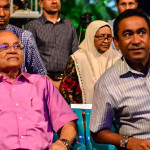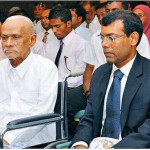Maldivian authorities have placed a restriction on the repatriation of foreign currency by expatriate workers including Sri Lankans to tackle an acute shortage of US dollars in the market, writes Feizal Samath for Sri Lanka’s Sunday Times, a move that recently triggered protests in the island nation.
“The restrictions, according to rules enforced in a gazette notification by the Maldivian Monetary Authority (Central Bank) on Friday, permits workers to remit their contracted salary and nothing more.
“The foreign exchange crisis in the Maldives has been precipitated by ballooning budget deficits spilling over from the regime of former President Maumoon Abdul Gayoom.
“Huge capital expenditure on new development which is not matched by revenue has widened the trade balance and precipitated the foreign exchange crisis. Banks have limited the issue of dollars. Most banks are limiting the issue of dollars against the rufiya (local currency) for repatriation, a move which has also affected tourism, the country’s main foreign exchange earner, and even for local business.
“’There is absolute confusion in the industry about how much can be retained by us in dollars (for our work). There are no clear guidelines,’” said a resort owner, accusing the government of mismanaging the economy.
“New taxes to be enforced in July on income and business profits, for the first time in the Maldives, have affected President Mohamed Nasheed’s popularity and led to a week of protests against cost of living and alleged corruption. Another new tax, Tourism GST was enforced from January.
“Prices of essential commodities have escalated and inflation has sharply risen mainly due to the shortage of dollars in the market. The Maldives imports all its needs except fish. Its main foreign earnings comes from the bed tax from tourism and fish exports while local taxes in the past have been limited to import duties and levies.
“The President’s chief spokesman Mohamed Zuhair, while acknowledging that the new measures have affected government’s popularity, has accused opposition parties and disgruntled businessmen unhappy over the taxes, of instigating the violent protests by youths, and also blamed unscrupulous traders for jacking up prices.
“He said while taxes were inevitable and had been announced a long time ago, the latest round of protests came after Mr Gayoom broke away from the main opposition DRP and formed his own faction.
Opposition spokesman Mohamed ‘Mundhu’ Shareef rejected the claim and said the protests were a natural reaction of the people against rising food prices and what he called ‘a corrupt regime’.”





